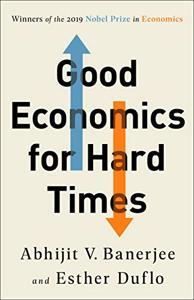
Want to learn the ideas in Good Economics For Hard Times better than ever? Read the world’s #1 book summary of Good Economics For Hard Times by Abhijit V. Banerjee, Esther Duflo here.
Read a brief 1-Page Summary or watch video summaries curated by our expert team. Note: this book guide is not affiliated with or endorsed by the publisher or author, and we always encourage you to purchase and read the full book.
Video Summaries of Good Economics For Hard Times
We’ve scoured the Internet for the very best videos on Good Economics For Hard Times, from high-quality videos summaries to interviews or commentary by Abhijit V. Banerjee, Esther Duflo.
1-Page Summary of Good Economics For Hard Times
Overview
The world is facing many problems, and it’s easy to get frustrated with them. We hear that immigration is out of control, taxes on imports will hurt the economy, and saving the environment will destroy jobs.
The world is filled with doomsday scenarios. It’s scary, and we don’t know who to believe. Instead of having a real debate about the issues, politicians are just yelling at each other.
Economists are often seen on TV, and they seem to be biased towards certain political parties or business interests. We don’t really understand how economists come up with their conclusions. In this article, you’ll have a chance to learn the basics of economics from two Nobel Prize-winning economists, which will help you better understand why so many politicians’ economic theories aren’t right, as well as why social problems can have solutions rooted in economics.
In this book, you’ll learn about the history of tariffs and how they can affect different industries. You’ll also learn why robots aren’t likely to take over accounting jobs anytime soon. Finally, you’ll read about how immigrants who move into a community can help create more job opportunities for local residents.
Big Idea #1: Economists can help us solve the world’s gravest problems – but they first have to gain our trust.
In a recent poll, people ranked nurses as the most trustworthy professionals. They also saw politicians in a very negative light and economists were seen as unreliable.
But why is that? Perhaps it’s because the economists we see on TV are not always trustworthy. They may be biased toward a particular company or have extreme views. Alternatively, they could be academics who aren’t very good at communicating with others. Whatever the case, their opinions don’t always make sense to laypeople and can seem irrational because of this lack of understanding.
The fact that people don’t trust economists is problematic. Why? Because we need to believe in them and listen to their advice about how to solve some of the world’s biggest problems. How can they earn our trust and talk in a way we understand?
To be credible, economists have to share their thought processes and data with the public. They also have to admit that they’re fallible. A lot of people are unwilling to change their minds about a topic if it goes against what they believe in. Economists need to be open-minded when looking at evidence so that they can revise their opinions as necessary and admit when they’re wrong.
Big Idea #2: Politicians mislead voters with lies about immigration.
Immigration is a controversial issue. Politicians like Donald Trump have painted a picture of their countries being under siege from hordes of immigrants who will use up resources and threaten the identity of locals.
Politicians use a simple economic model to explain immigration. They argue that immigrants will be attracted by the financial riches of America, so they’ll come in droves and take jobs from native workers.
This argument seems logical, but it doesn’t hold up against the evidence. For one thing, people don’t move from their home countries just because they want to make more money. There’s a lot of evidence that shows this isn’t true at all; for example, if that were true then there would have been a huge migration from Greece when its economy crashed in 2013. However, only 3% of the population moved to other European countries despite being legally allowed to do so.
Studies have shown that people are unwilling to move even within the same country. For example, one study found that Indians living in rural areas would double their income if they moved to a city. But only a small percentage of the desperately poor people actually do so.





